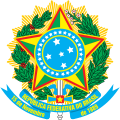 | |
 President Lula da Silva's Cabinet pictured in January 2023 | |
| Formation | 24 January 1891 |
|---|---|
| Purpose | Advisory body to the president of Brazil |
| Location |
|
| Luiz Inácio Lula da Silva | |
Membership | 38 members (not counting the VP):
|
| Website | www |
| This article is part of a series on the |
| Politics of Brazil |
|---|
 |
The Cabinet of Brazil (Portuguese : Gabinete do Brasil), also called Council of Ministers (Portuguese : Conselho de Ministros) or Council of Government (Portuguese : Conselho de Governo), is composed of the Ministers of State and senior advisors of the executive branch of the federal government of Brazil. Cabinet officers are appointed and dismissed by the President. There are currently twenty-three Ministries, including six Ministry-level offices: the Chief of Staff, General-Secretariat of the Presidency, Secretariat of Institutional Relations, Secretariat of Social Communication, Personal Office of the President of the Republic and the Institutional Security Office. Other institutions also assists the Presidency.